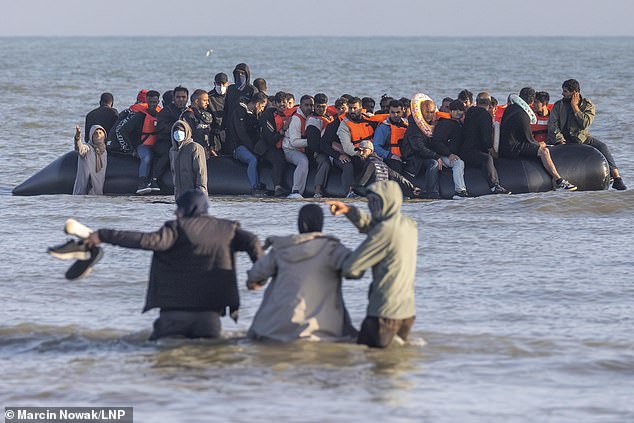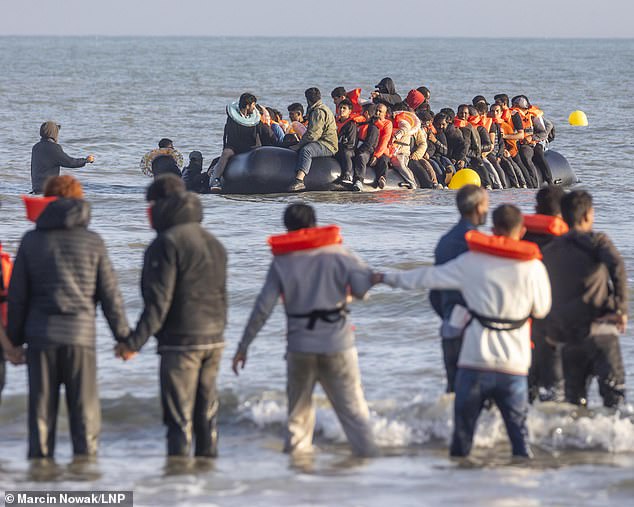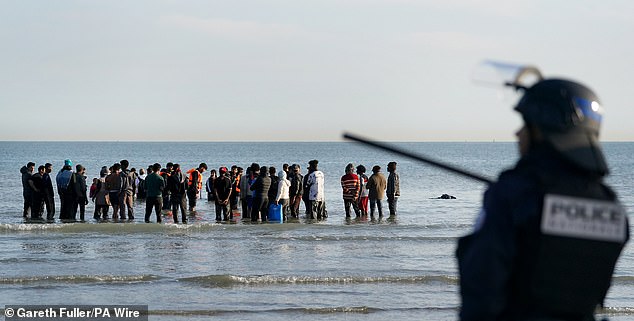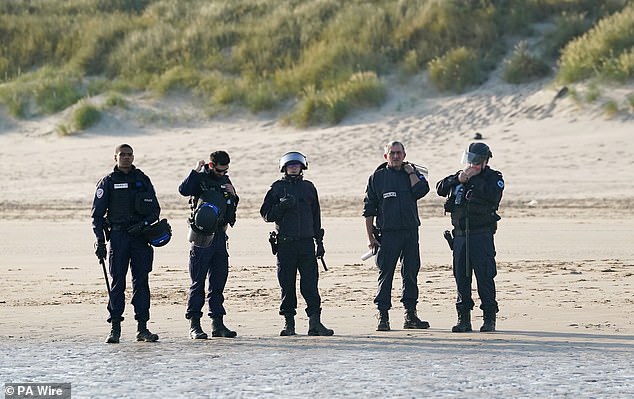A huge boat of migrants was able to leave French shores this morning – because the police were standing in the wrong place.
French cops were no where to be seen when the boat carrying 60 migrants made up of men, women and children set sail from Gravelines.
Instead, they were standing half a mile away on the beach, despite expecting crossings on a clear morning of weather like today.
This year so far, more than 18,000 migrants have arrived via the Channel, in a record for this point in the year since data collection began in 2018.
One eye-witness said: ‘It was comical. They had been out in force all morning and yesterday were patrolling the beaches for this morning.
‘Then when it came to it they were nowhere to be seen. It was like a Carry On film. It was incredible.
‘It was one of the biggest boats to launch in weeks as well. Men, women and children were on board. It was shocking.
‘The police had positioned themselves in one place and they missed it entirely.

A huge boat of migrants was able to leave French shores this morning – because the police were standing in the wrong place

French cops were no where to be seen when the boat carrying 60 migrants made up of men, women and children set sail from Gravelines
‘It begs the question what the British taxpayer is spending millions of pounds a year on.’
Another eye-witness said French police had spent more time trying to intervene with the media observing the crossings than stopping them.
They said: ‘The police caused issues for the media but were in the wrong place for a large crossing. It’s a joke.’
It comes only weeks after it was announced that French police will now be able to stop the small boats while they are still in shallow waters.
French cops have typically only been able to intervene before refugees and migrants enter the water, unless they are rescuing someone who is at risk of drowning.
French authorities are reportedly set to introduce this new maritime doctrine from the beginning of July which would allow police to intercept dinghies up to 300 metres from the shore.
But French police unions are sceptical that the proposed measures can realistically be implemented, due to limited means and human resources.
‘It’s going to require quite a large number of boats, because we have to cover a strip of 300 metres along 180 kilometres so… this means aerial surveillance too,’ Alliance police union representative Julien Soir said, adding it would required allocating ‘hundreds of (additional) officers’.

A new ‘maritime doctrine’ set to come into operation next month allows French police officers to block dinghy departures within 300 yards of the shoreline

Currently, they are barred from intercepting any boat once it is in the water (pictured French authorities seen on a beach in Gravelines as they watch people thought to be migrants wade through the sea to board a small boat leaving the beach)
Today is expected to be a busy day, as the calm water and warm weather make it likely for hundreds to set sail for the UK.
Trips across the Channel have become far more deadly over time, with 73 people passing away while trying to reach the UK in 2024 – five times the number in 2023.
It is thought this is due to ruthless smuggling gangs switching up tactics and heavily overcrowding boats, often forcing 80 people or more to cram into each dinghy.
Earlier this month, more than 50 police tried to stop as many as 200 migrants in Gravelines reaching the sea – and with the aid of teargas grenades stopped more than half.
But those who dodged police simply waited for the so-called ‘taxi boat’ to ferry them across the Channel while police remained under strict rules to not apprehend anyone in the sea.
A Downing Street spokesman said at the time that Keir Starmer and Emmanuel Macron agreed during a meeting at the G7 in Canada that the Channel situation was ‘deteriorating’.
The pair both believe that ‘migration should be a key focus’ and they should ‘continue to work closely with other partners to find innovative ways to drive forward progress’, according to a No.10 readout.
The two leaders are reportedly working on a ‘one in, one out’ scheme where Britain would take on asylum seekers who have family ties to the UK in exchange for small boat migrants returned to France.
Details are yet to be finalised but five EU countries have already raised concerns about the deal.
Italy, Spain, Greece, Malta and Cyprus are said to have sent a letter to the European Commission over ‘serious concerns for us, both procedurally and in terms of potential implications for other member states, particularly those of first entry’, The Financial Times reported.
They are concerned that France will use existing rules that would send migrants to the first country in Europe they arrived in – with these five countries often being the first place they come to.












